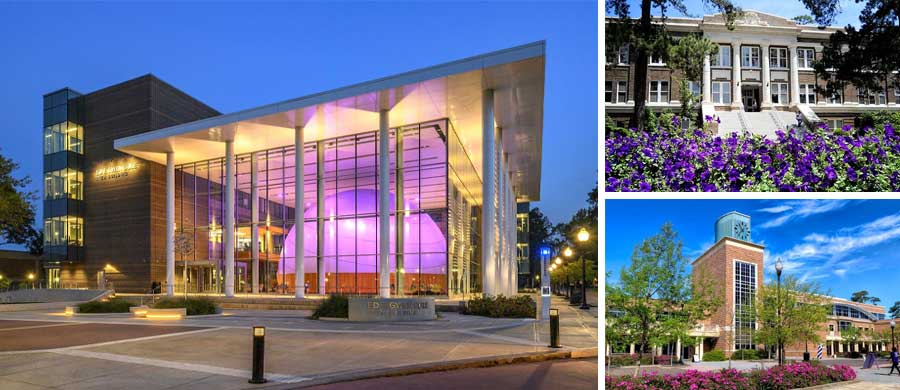Aug. 8, 2023
Search Advisory Committee announced
Stephen F. Austin State University is a comprehensive, regional institution located in Nacogdoches, Texas. The university enrolls approximately 11,000 students, offering more than 80 undergraduate majors spanning 120 areas of study within six academic colleges – business, education, fine arts, forestry and agriculture, liberal and applied arts, and sciences and mathematics. Accredited by the Southern Association of Colleges and Schools, SFA provides the academic breadth of a state university with the personalized attention of a private school.

As the chief executive officer of SFA, the president leads development and implementation of goals and strategies to achieve the University’s mission. The full position description is available here.
Committee members were selected in accordance with the Board of Regents’ Rules and Regulations, which includes a provision for representation on such committees by various constituencies of the institution.
Search Advisory Committee announced
First meeting of the Search Advisory Committee
Search Advisory Committee meeting
Search Advisory Committee interviews candidates and recommends candidates for further review
Board of Regents invites candidates in for interviews
Board of Regents names a sole finalist for the position
You are invited to (1) nominate a candidate or (2) offer comment that may be helpful to the committee on the qualities of the candidates you hope SFA will attract. If you nominate a candidate, the box below will ask you to identify yourself so the search firm can speak with you confidentially about your nomination. If you simply wish to offer a comment you may so anonymously or by identifying yourself, should you elect to do so. Everything submitted via this website is done so confidentially and will not be available to the public.
Per Regents’ Rules and Regulations, a Search Advisory Committee is established to recommend candidates to the Board.
The chancellor, the executive vice chancellor for health affairs or the executive vice chancellor for academic affairs serves as chairman of the committee; the Board chairman may make a different or additional appointment.
In order to ensure broad representation, the membership of the Search Advisory Committee membership is dictated by Regents’ Rules and is as follows:
(a) At least one regent to be appointed by the Board chairman.
(b) Two presidents from UT institutions to be appointed by the Board chairman.
(c) The executive vice chancellor for academic or health affairs (depending whether the presidential search is for an academic institution or a health institution).
(d) Three faculty members from the institution involved. The method of selection for faculty members is determined by the faculty governance of the institution.
(e) One dean, to be selected by the Deans’ Council of the institution involved for academic institutions. At health institutions, the member will be the dean of the medical school or, in the absence of that position, the member will be a senior representative of the teaching program of the institution selected by the Board chairman.
(f) One student from the institution involved. The method of selection is determined by the student governance of the campus.
(g) The president of the alumni association of the campus involved.
(h) One non-faculty employee of the institution involved. The method of selection is determined by the staff or employee council of the institution involved.
(i) At least two representatives of the institution’s external constituency who have demonstrated a deep interest in and support of the institution, its programs and its role in community activities, to be appointed by the Board chairman.
The UT System Board of Regents selects the president of each institution, following interviews of top candidates. The Board of Regents considers recommendations from the Search Advisory Committee as well as comments and nominations from the public.
The Search Advisory Committee, which has broad representation from both the institution and community, may interview candidates as part of its selection process, but these interviews must remain confidential. After their recommendations are submitted to the Board of Regents, the Regents subsequently interview a slate of candidates and typically name a sole finalist or finalists. After the public naming of the finalist(s), there is a state-mandated 21-day waiting period before the Board can officially appoint the president. During this time period, the finalist(s) may visit the campus to meet with students, faculty, staff and community members.
Per state law (Texas Education Code 552.123), after the Board names a finalist or finalist(s), it must wait 21 days to officially appoint a finalist as president. This gives the public an opportunity to present additional comments or concerns about a finalist before he or she is officially named president. During this time period, the finalist(s) may visit the campus to meet with students, faculty, staff and community members.
Yes, the UT System online portal is set up to allow any member of the public to submit a comment or nomination. These comments and nominations may be submitted anonymously.
Per Texas Education Code 552.123, the names of applicants or candidates for the position of president of a public institution of higher education may remain confidential. However, when the Board names a finalist or finalist(s), it must publicly announce the name(s) and then wait 21 days to officially appoint a finalist as president.
Furthermore, names of applicants are kept confidential to allow the best possible candidates to enter the search without concern that their names will be revealed while employed elsewhere.